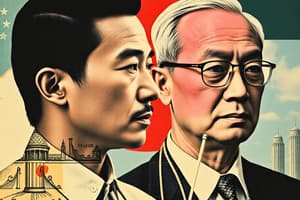Podcast
Questions and Answers
What era did General Soeharto's economic policies cover?
What era did General Soeharto's economic policies cover?
1966-1998
What was one of the major outcomes of the 1997-98 economic crisis in Indonesia?
What was one of the major outcomes of the 1997-98 economic crisis in Indonesia?
End of Soeharto's rule
Which of the following policies did Soesilo Bambang Yudhoyono prioritize after being elected in 2004? (Select one)
Which of the following policies did Soesilo Bambang Yudhoyono prioritize after being elected in 2004? (Select one)
- Anti-corruption measures (correct)
- Export increases
- Military development
- Isolationist policies
What major global event impacted Indonesia's economy in 2008-09?
What major global event impacted Indonesia's economy in 2008-09?
Indonesia is not heavily dependent on the export of raw materials.
Indonesia is not heavily dependent on the export of raw materials.
What was one effect of the global financial crisis on the Indonesian rupiah?
What was one effect of the global financial crisis on the Indonesian rupiah?
What measures did the Indonesian government introduce in response to the economic challenges? (Select all that apply)
What measures did the Indonesian government introduce in response to the economic challenges? (Select all that apply)
What role did Bank Indonesia play during the economic crisis?
What role did Bank Indonesia play during the economic crisis?
Indonesia's recovery from the global financial crisis was immediate.
Indonesia's recovery from the global financial crisis was immediate.
What lesson did Indonesia learn from the 2008-09 economic crisis?
What lesson did Indonesia learn from the 2008-09 economic crisis?
Study Notes
Indonesian Economic Policies: A Historical Overview
- Indonesia's economic policies have evolved significantly from the New Order era under Soeharto (1966-1998) to the present.
- Soeharto's regime saw significant economic growth through Western capital inflow, political stability, and six Five-Year Development Plans (Repelitas).
- Corruption and weak governance under Soeharto led to the 1997-98 economic crisis, ending his rule.
- Soeharto's successors initiated political reforms and economic stabilization efforts.
- In 2004, Soesilo Bambang Yudhoyono prioritized pro-growth, pro-poor policies and anti-corruption measures, followed by the RPJMN 2010-14, focusing on inclusive and equitable development.
Indonesia's Experience with the 2008-09 Global Financial Crisis
- The 2008-09 global financial crisis significantly impacted Indonesia due to reduced global demand, declining exports, and a steep drop in commodity prices.
- As a country heavily reliant on exporting raw materials and commodities like palm oil and rubber, Indonesia was particularly vulnerable to the global downturn.
- The weakening global economy led to reduced demand for Indonesian exports, putting pressure on economic growth.
- The global recession caused significant disruptions in financial markets, affecting Indonesia's currency and stock market.
- The rupiah depreciated due to capital outflows from emerging markets, leading to increased inflationary pressure and strain on businesses.
- The fall in the stock market led to liquidity shortages, making it difficult for businesses to secure funding.
- The crisis highlighted Indonesia’s vulnerability to external economic shocks and reduced foreign direct investment (FDI) inflows, further exacerbating the economic slowdown.
Indonesia's Response to the Global Financial Crisis
- The Indonesian government introduced a range of monetary and fiscal measures to stabilize the economy.
- A fiscal stimulus package was introduced to boost domestic demand, creating jobs and stimulating economic activity.
- Social safety net programs were implemented to provide financial support to low-income families.
- Bank Indonesia lowered interest rates to increase liquidity and stabilize the financial system, encouraging investment and consumption.
- Bank Indonesia also intervened in the currency markets to stabilize the rupiah, helping to prevent further inflationary pressures.
Indonesia's Post-Crisis Recovery and Lessons Learned
- Despite the measures taken, recovery was gradual due to the global nature of the recession.
- Indonesia's strong domestic market, supported by government interventions, helped the country recover more quickly than many other emerging markets.
- The crisis highlighted the need for a more resilient economic system, including diversifying the economy away from commodity dependence and strengthening its financial system.
- The government's response, including promoting infrastructure development and enhancing social safety nets, helped mitigate the crisis’s impact.
Studying That Suits You
Use AI to generate personalized quizzes and flashcards to suit your learning preferences.
Related Documents
Description
Explore the evolution of Indonesia's economic policies from the New Order era under Soeharto to current practices. This quiz covers major events, reforms, and challenges, including the impacts of the 1997-98 crisis and the 2008-09 global financial crisis. Test your knowledge on Indonesia's economic history and policy shifts.




